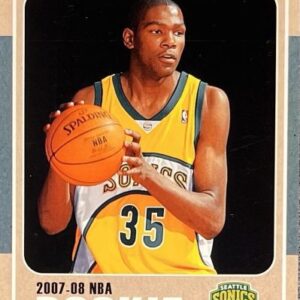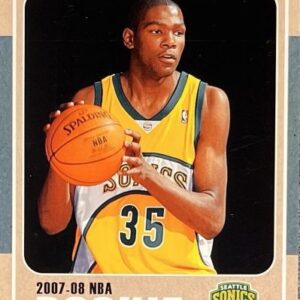There are some objects that capture an era. They steal attention in rooms full of clutter and nostalgia, not just because they’re rare or valuable but because they encapsulate an entire feeling or aesthetic in a way that transcends their mere physical form. Michael Jordan’s 1995-96 Flair Hot Numbers card is one such artifact from the golden age of sports cards—a dazzling piece of ‘90s memorabilia that manages to bridge the gap between art and commerce in a swirling dance of color, layers, and undeniable flair.
Remember the 1990s when everything seemed to happen all at once? Fashion took on bold forms, music diverged into a myriad of genres, and sports cards evolved from basic portrait gimmicks into something more akin to miniature pop art pieces. Enter Flair Hot Numbers Jordan, a 15-card insert run that stood out not only for its rarity but for its arresting, multi-dimensional design. It was the mid-90s, after all—a time when material style often shouted rather than whispered, and this card promised to deliver exactly that.
Produced amid the Chicago Bulls’ dynastic run, the Hot Numbers card falls perfectly into the narrative. During this period, the Flair brand sought validation for its premium approach to card-making at a time when the allure of chrome was hypnotic and pervasive. By inserting layered lenticular printing to make numbers dance and light play on its surface, Flair was essentially saying: “We’re as electrifying as any new wave tech, but in our own stately, nostalgic way.”
And as daunting as its slick design might be, it was the card’s scarcity that completed its allure. Securing the card raw was nothing short of an expedition through a jungle of wax. Appearing once in roughly 36 packs, even for seasoned collectors, unsealing a box only to discover not a single Hot Numbers card served as a rite of passage into the zany world of 90s collecting. Today, PSA 10s attract attention similar to rare artwork, drawing exuberant bids, sometimes nearing four thousand dollars when the stars align correctly on the auction block. Factor in the sales history—albeit fluctuating—and it’s clear a perfect version of this card is not just valuable; it’s a statement of ‘90s connoisseurship.
Collectors and condition hawks live for the moment a PSA 10 comes into view. It’s when the proverbial room suddenly forgets to breathe. This is partly down to the card’s lenticular surface, which both protects and hides, throwing flaws into obfuscation unless the light strikes from a revealing angle. Premium sales, often surpassing the four-grand mark, show what happens when teams of bidders find that moment where timeless allure meets perfect preservation.
Visually, the card is a hallmark of mid-90s design brilliance. Forget modern-day holograms and die-cut edges; the Hot Numbers Jordan embraces a more nuanced, layered aesthetic that seems to animate across tabletops and showcases alike. It’s unmistakable even from a distance as it gleams on the floor of a trade show, radiating a sense of depth and geometry that commands a second look.
But beyond its aesthetic appeal and scarcity, the Hot Numbers card tells a broader story of a time when Flair dared to rival the rising chromium tide without forsaking its paper-and-foil legacy. Focusing on quality and mystique, the card justified its premium status in an era saturating with emerging tech gimmicks. It was—and remains—a graphic design marvel masquerading as a piece of athletic memorabilia. It’s what you show your friends to remind them that, yes, cardboard can indeed be art.
For those engaged in the thrill of collection, this isn’t just about filling holes—it’s about curating a visual timeline. Slotted next to contemporaries like New Heights or Scoring Kings, or integrated within a shrine dedicated to MJ himself, the card speaks to the era when sports cards weren’t merely status symbols but cultural touchstones.
Auction data from this year delineates a clear market price, with PSA 10s ambling around the four-grand territory, not considering extra oomph from stellar visual appeal or competitive bids locking horns at the finish line. Here, the general rule remains: let the auctioneers do the unveiling when a quintessential version makes its move.
All this plays into why the Flair Hot Numbers card remains attractive—a tribute to a decade marked by both excess and the novel, exaggerating not just Michael Jordan’s brilliance, but also the point when card collecting itself felt like magic. So when you see that iconic lenticular finish light up, you’re not just holding a card; you’re clasping a vivid piece of nostalgia bundled with cultural significance—illustrating a roaring time defined by both flamboyance and history in the making.





